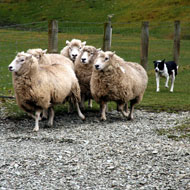
Changes announced to reporting of livestock movements
Changes to livestock movement bureaucracy will save farmers and taxpayers £70 million while improving the prevention and control of diseases such as bovine TB, a Government minister has said.
MP Owen Paterson, Secretary of State for Environment, Food and Rural Affairs, spoke of the changes at the Oxford Farming Conference yesterday.
"Our farming industry is a cornerstone of our economy but for too long farmers have had to operate within overly complex rules and requirements," he said.
"This change to the system for reporting animal movements will save farmers and taxpayers millions of pounds, while increasing our resilience to animal diseases."
The new rules, which will come into effect in two years' time, will allow sheep farmers to double the size of their farms from five to ten miles, enabling them to move their livestock around more without the need to report it.
Red tape requiring the reporting of grazing on temporary land within ten miles, will be removed.
Sole Occupancy Authorities (SOAS) ad Cattle Tracing Systems will also be scrapped.
The changes follow recommendations by The Task Force on Farming Regulation, set up by Defra to find ways of cutting red tape and enabling the farming industry to thrive.
Michael Seals, chairman of the Animal Health and Welfare Board for England, said: "These changes will improve our ability to react to disease outbreaks by creating a more effective system to report and track livestock movements.
"When an outbreak occurs, having a clear idea of where animals have been is vital in ensuing we can swiftly get to grips with the disease."
Richard MacDonald, chair of the Farming Regulation Taskforce, said: "These proposed changes follow closely part of the Task Force recommendations and will make a really significant improvement to local livestock movements."



 HMRC has invited feedback to its communications regarding the employment status of locum vets and vet nurses.
HMRC has invited feedback to its communications regarding the employment status of locum vets and vet nurses.